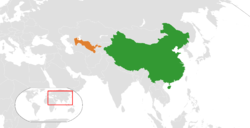China–Uzbekistan relations (Uzbek: Xitoy-O'zbekiston munosabatlari) are the bilateral relationship between China and Uzbekistan. Both countries are members of the Shanghai Cooperation Organization.
 | |
China |
Usbekistan |
|---|---|
| Diplomatic mission | |
| Chinese Embassy, Tashkent | Uzbek Embassy, Beijing |
| Envoy | |
| Ambassador Jiang Yan | Ambassador Farhod Nuritdinovich Arziev |
History
editAccording to the Ming Shilu, ambassadors from the Uzbek Khanate and Bukhara Khanate corresponded with Ming China more than 20 times between 1488 and 1618.[1]
China recognized Uzbekistan's independence on 27 December 1991 and the two countries established relations on 2 January 1992.[2] Both countries signed the "China-Uzbek Treaty of Friendship and Cooperation" in 2005, during Uzbek leader Islam Karimov's meeting with Chinese leader Hu Jintao in Beijing.[3]
Uzbekistan has cooperated with China in extraditing Uyghur activists from the country.[4] In July 2019, UN ambassadors of 37 countries, including Uzbekistan, signed a joint letter to the United Nations Human Rights Council defending China's persecution of Uyghurs.[5][6] Uzbekistan was one of 16 countries that defended China in 2019 but did not do so in 2020.[7]
Uzbek Prime Minister Abdulla Aripov called China Uzbekistan's "closest partner" on a 26 August 2019 meeting.[8]
Economic relations
editChina is the second-largest importer of raw materials from Uzbekistan.[9]: 152 As of 2024, significant Chinese investment in the country has resulted in approximately 600 Chinese-Uzbek joint enterprises.[9]: 152
China has also increasing its development loans to Uzbekistan.[8] China regards Uzbekistan as a critical part of the Belt and Road Initiative.[citation needed]
Cultural and educational
editIn 2013, Uzbekistan and China signed a cultural exchange agreement to increase engagement in culture, education, science, and technology.[9]: 159 The first exchange per the agreement occurred in 2017, during which seminars, exhibitions, and performances were held.[9]: 159 These exchanges have been repeated since.[9]: 159
China provides support for the preservation of and restoration of cultural heritage sites in Uzbekistan.[9]: 159
China Central Television (CCTV) and Uzbekistan's National Television and Radio Corporation (UzTRK) cooperate to produce joint programs and documentaries.[9]: 159
Uzbekistan has two Confucius Institutes.[9]: 156
References
edit- ^ "The Tūqmāq (Golden Horde), the Qazaq Khanate, the Shībānid Dynasty, Rūm (Ottoman Empire), and Moghūlistan in the XIV-XVI Centuries: from Original Sources" (PDF). Archived from the original (PDF) on 2023-01-16. Retrieved 2022-05-08.
- ^ "Cooperation of the Republic of Uzbekistan with the countries of the Asia and the Pacific". Ministry of Foreign Affairs. Archived from the original on 2015-10-22. Retrieved 2020-12-24.
- ^ Buckley, Chris (2005-05-27). "China 'honors' Uzbekistan crackdown". The New York Times. ISSN 0362-4331. Archived from the original on 2020-01-31. Retrieved 2020-01-31.
- ^ Jardine, Bradley. "China's Surveillance State Has Eyes on Central Asia". Foreign Policy. Archived from the original on 2019-11-15. Retrieved 2020-01-31.
- ^ "Which Countries Are For or Against China's Xinjiang Policies?". The Diplomat. 15 July 2019. Archived from the original on 16 July 2019. Retrieved 13 May 2024.
- ^ "Saudi Arabia and Russia among 37 states backing China's Xinjiang policy". Reuters. 12 July 2019. Archived from the original on 2019-12-10. Retrieved 2019-07-13.
- ^ Basu, Zachary (8 October 2020). "Mapped: More countries sign UN statement condemning China's mass detentions in Xinjiang". Axios. Archived from the original on 1 November 2020. Retrieved 18 December 2020.
- ^ a b "Uzbekistan Increasingly Turns to China for Development Loans". Jamestown Foundation. Archived from the original on 2019-09-09. Retrieved 2020-01-31.
- ^ a b c d e f g h Sun, Yi (2024). "Necessitated by Geopolitics: China's Economic and Cultural Initiatives in Central Asia". In Fang, Qiang; Li, Xiaobing (eds.). China under Xi Jinping: A New Assessment. Leiden University Press. ISBN 9789087284411. JSTOR jj.15136086.